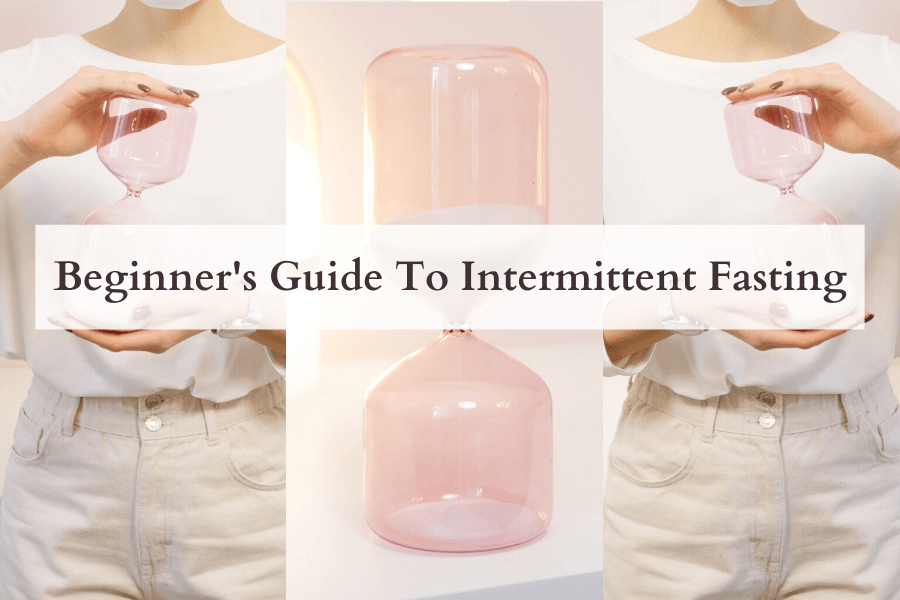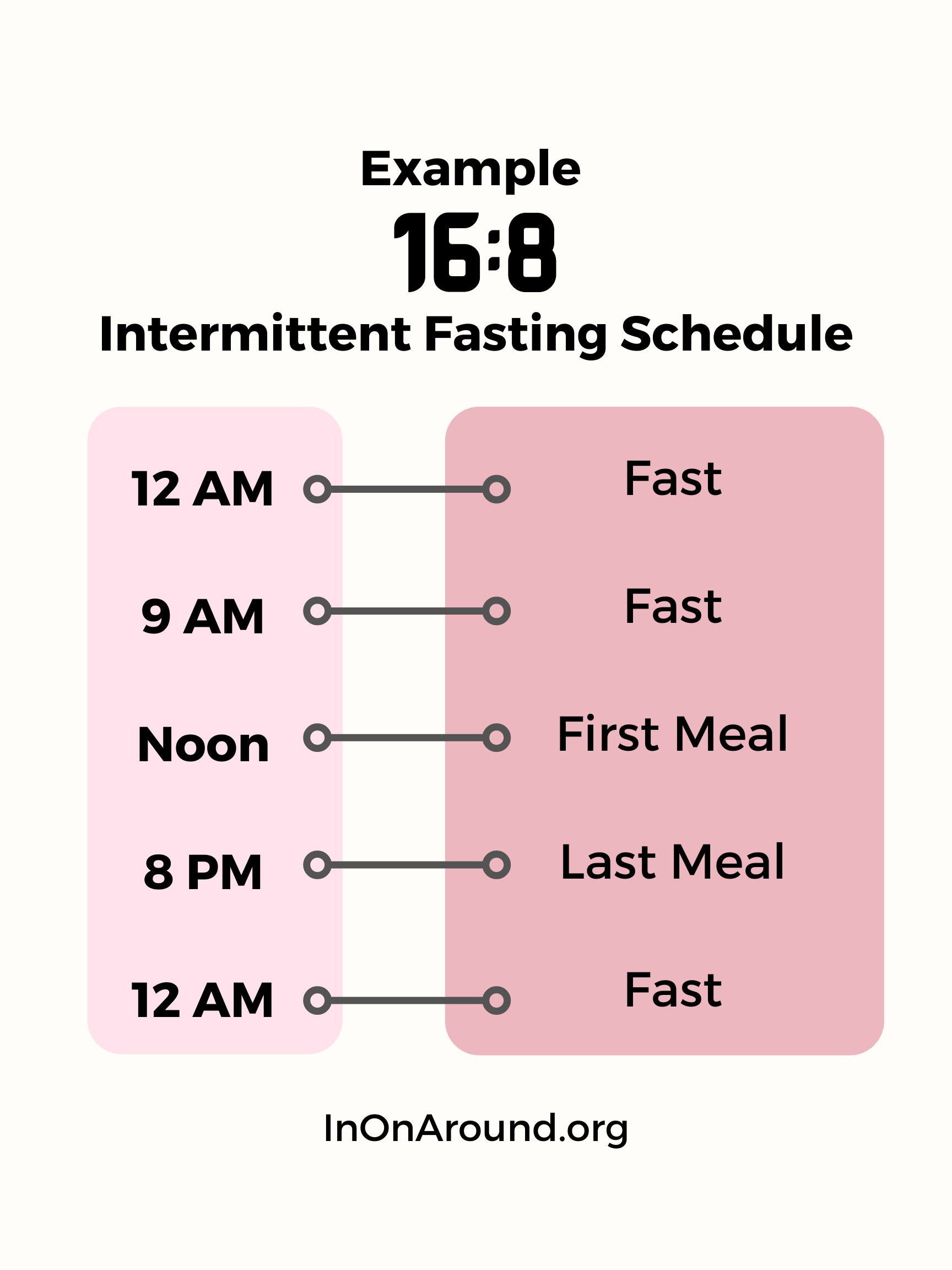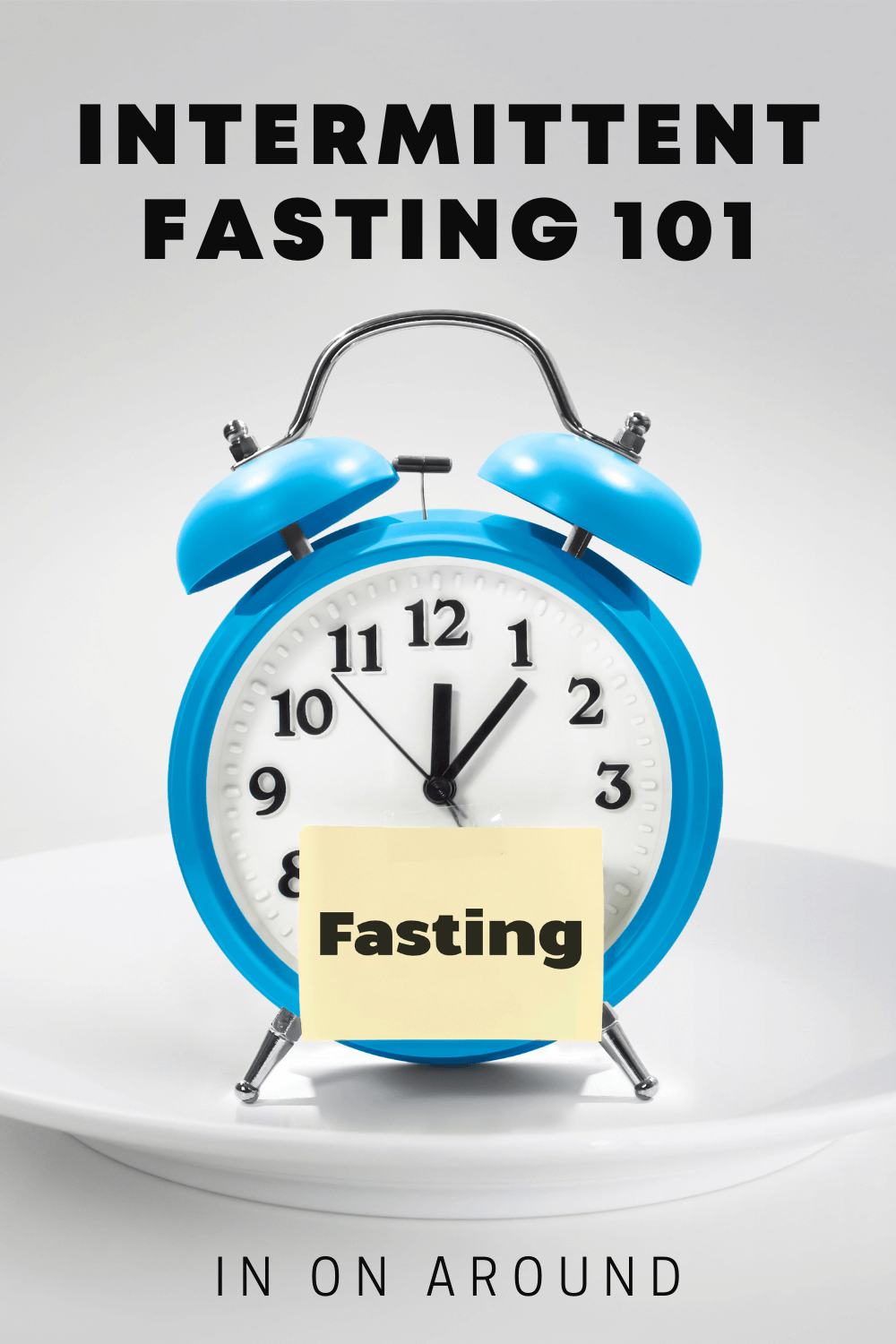Intermittent fasting has become a growing trend – and it’s adored by many health-conscious celebrities, like Jennifer Aniston and Kourtney Kardashian. Instead of focusing on “what” to eat, intermittent fasting focuses on “when” you should eat. But is this another “fad diet”… or are there actually benefits to it? 18/6 vs 16/8 intermittent fasting – what’s the difference? This is your beginner’s guide to intermittent fasting.
How much fasting is too much? Who should avoid intermittent fasting? Are women and men affected differently? In this article, you’ll learn the ins and outs on intermittent fasting & who should avoid it.
Keep reading to learn more!

(Note: This article contains affiliate links, meaning In On Around will make a small commission at no additional cost to you. This helps me maintain the site. As always, I value full transparency & only work with brands I love and trust.)
What Is Intermittent Fasting?
Intermittent fasting involves condensing your food consumption within a specific window of time during the day. You’re essentially alternating between periods of eating and periods of fasting.
Intermittent fasting has been a practice used for hundreds of years by our ancestors. They had to hunt and gather for their food – it’s not like they always had a constant supply of food available at all times! It’s also very common throughout history for specific religious holidays.
It’s more of an “eating pattern,” than a diet, per se, but it’s touted for its many health benefits. As of late, it’s been very popular amongst the keto diet community.
What Are The Benefits Of Intermittent Fasting?
Having a fasting window and an eating pattern…
- May help with weight loss and reduce body fat, thus potentially reducing the risk of cardiovascular disease, type 2 diabetes, and other weight-related illnesses [1]
- May reduce the risk of developing heart disease [2]
- Can increase the number of neurons, leading to better memory & slowing cognitive decline [3]
- Potentially improves tissue repair and cellular repair [4]
- Can potentially increase longevity [5]
- May provide you with increased energy [6]
- Gives your gut a chance to rest [7]
Important note: most human studies on intermittent fasting have been performed on MALES.
WOMEN – we must be very, very careful with fasting as it can cause issues with our delicate hormone balance.
How Do You Intermittent Fast?
It is most common to fast overnight (since you’ll be sleeping for 8+ hours anyway). Here are some of the three most common fasting schedule methods:
16:8 Method (16/8)
- Eat within an 8-hour window
- Fast for a 16-hour window
- Also known as the “Lean Gains Protocol”

14:10 Method (14/10)
- Eat within a 10-hour window
- Fast for a 14-hour window
12:12 Method (12/12)
- Eat within a 12-hour window
- Fast for a 12-hour window
When I practice intermittent fasting, I opt for the 16:8 method or 14:10 method. These are less restrictive and more of a “planned eating routine.” It’s essential to listen to your body – if you are hungry, eat a nutritious meal. Over time, if you stick to a routine eating schedule, your body will adjust.
18/6 vs 16/8 Intermittent Fasting:
The difference between an 18/6 and 16/8 intermittent fasting schedule is the amount of time within the eating window. The former has a 6-hour eating window, while the later has an 8-hour eating window.

Methods Of Fasting That I Do Not Recommend For Most People
- 18:6 (18/6) – Fasting for 18 hours, with a 6 hour eating window.
- 5:2 Diet – Eating normally for 5 days and restricting calories to 500 calories/day for 2 days of the week. This is a form of nonconsecutive fasting.
- Eat Stop Eat – Involves a 24-hour fast once or twice a week.
- Alternate Day Fasting – Fasting every other day
- 20:4 Method, aka The “Warrior Diet” – Eating small amounts of raw vegetables & fruit, with a massive meal at the end of the day.
Many of these can lead to an unnecessary diet plan or disordered eating, like extreme restriction and bingeing – it’s best to avoid them. Long periods without food can do more harm than good. Food is fuel… we need it to survive!
Who Should and Should Not Intermittent Fast?
Should:
- Men looking to lose weight or improve fat burning
- Women looking to lose weight (only in extreme moderation)
- Those looking to give their digestive system a little “break”
Should Not:
- Those with a history of an eating disorder
- Men and women suffering from hormone imbalances or blood pressure issues
- Children or teenagers
- Women who are pregnant or breastfeeding
- Those with blood sugar imbalances or diabetes
Intermittent fasting is certainly NOT for everyone.
How Should You Break Your Fast?
The word breakfast, really means break-fast… you are “breaking” your fast!
Breakfast = Break-fast
This is why breakfast is often coined as the most important meal of the day.
Technically, when you’re fasting, you’re allowed to drink unsweetened tea and coffee, however, I would advise sticking to water. Too much caffeine on an empty stomach can lead to digestive issues, especially in those who are particularly sensitive. Since caffeine is a stimulant, drinking it on an empty stomach can increase the “jitters,” as well as damage your stomach lining and cause indigestion.
That being said, how you break your fast is incredibly important.
Breaking your fast with donuts, cookies, and other foods full of artificial flavoring, sugar, and gums defeat the whole purpose. That would quickly spike your blood glucose levels (blood sugar levels)! Avoid sugary drinks, refined carbs, processed foods, saturated and trans fats where you can – stick to real, whole, predominantly plant-based foods (organic wherever you can).
How Much Fasting Is Too Much (Men vs. Women)?
There is a lot of research that is “pro” intermittent fasting and “against” intermittent fasting. However, there is still limited research on how long-term intermittent fasts can impact the body. As with everything, moderation is key.
Key point: Women can be impacted by intermittent fasting in different ways than men!
- Blood sugar levels in women can actually worsen [8]
- Women’s reproductive hormones can be negatively impacted, contributing to infertility, poor bone health, period irregularity etc… [9]
- Even regularly skipping breakfast can have a serious impact on hormone balance.
- In female animal studies, fasting can lead to reduced ovary size [10]
Our bodies thrive off routine… but they do NOT thrive on calorie restriction or starvation. Women need to take extreme caution with fasting & avoid long fasts.

Intermittent Fasting Tips For Beginners
- Ease into it. It can take a couple of weeks before your body gets used to its new routine.
- Eat very nutritious and balanced meals, with adequate levels of protein. The quality of your diet is absolutely crucial. Make sure you’re eating enough healthy fat, to avoid severe blood sugar crashes. Meal planning might help! Organic & predominantly plant-based is the way to go. Eating healthy will always be MORE important than meal timing!
- Drink water throughout the day – you don’t want to get dehydrated!
- Don’t obsess over fasting. Listen to your body! Fasting properly in the short term is WAY better than fasting improperly for the long term.
- Intermittent fasting can be a nice way to give your digestive system a bit of a break, but it will *not* solve all of your health issues. Be cautious with those who claim otherwise.
Note: you should still be eating enough daily calories! All you are changing is the eating and fasting window.
In Summary – Do I Recommend Intermittent Fasting?
For men (without conflicting health conditions) – Go for it! But nothing in excess. Listen to your body and do NOT starve yourself. You must eat enough calories daily.
For women – With extreme caution only. I personally do not recommend more than a 16:8 fast. Only for women without hormone imbalances, blood sugar imbalances, or an eating disorder.
As always, consult with your naturopathic healthcare provider on side effects before starting an intermittent fasting journey.
Frequently Asked Questions
Click on the below FAQs to learn more!
What is intermittent fasting?
What are the health benefits of intermittent fasting?
Who should do intermittent fasting?
Who should not do intermittent fasting?
Do you INTERMITTENTLY fast?
What did you think about this beginner’s guide to intermittent fasting?
What form of intermittent fasting do you do, if any? Let me know in the comments below! You can watch our web story here.
xoxo,

Want to read more? Check out my other articles here!
Information for “18/6 vs 16/8 intermittent fasting” from: John’s Hopkins Medicine, Marie Claire, Newsweek, Healthline, Better Health, Insider, Inverse,
Copyright In On Around LLC 2021 ©. The statements made on this website have not been evaluated by the FDA (U.S. Food & Drug Administration). They are not intended to diagnose, treat, cure, or prevent any disease. The information provided by this website should not be used as individual medical advice and you should always consult your doctor for individual recommendations and treatment.



